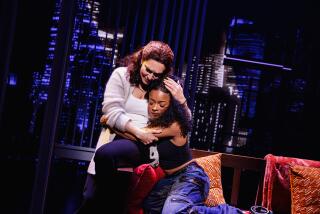Is it time for the National Book Awards to change? Yes.
As a member of the board of the award-bestowing National Book Critics Circle, I tend to look to the National Book Awards as a popular big brother: They are the football to our field hockey, the Oscars to our Independent Spirit Awards, the prizes that tend to capture the public’s attention. Both have their place, and the place of the National Book Awards is to lead the national conversation about books.
To the degree that there is one.
I wish we talked more about books. We, you and me, we talk about books all the time, and I’m eminently grateful for it. But to the general populace, “NBA” doesn’t mean book awards -- it means basketball.
The changes announced Tuesday won’t displace basketball in the popular culture, but they stand a good chance of raising the awards’ profile somewhat. And that’s a good thing.
As you probably heard, the NBAs have added a new layer of public competition to their awards: a longlist of 10 books will be announced in each of its four categories: fiction, nonfiction, poetry and young adult literature. The longlist will come in September, about a week after Labor Day, and five weeks later the prizes will be whittled down to five-title shortlists, and five weeks after that, the winners at the awards’ annual gala.
That’s following the model of the Man Booker prizes, the British literary awards that have such a presence in the popular culture that being on the list can make a huge sales difference in England, and bookies take bets on who the winner will be.
If it’s unlikely oddsmakers in Las Vegas will follow suit, it’s also a very good setup for allowing a conversation around the books to flourish. Lengthening the run-up heightens the sense of competition, which is a little scary but also a little exciting. Competition has been the driving delight of the Tournament of Books at the Morning News, which uses the college basketball bracket model (there’s basketball again) to pit novels against one another, an idea so inspired that it’s spawned dozens of imitators.
“The Bookers do a fantastic job at getting a conversation going about good books. With the longlist, for instance, you get this conversation bubbling up about what made it and then about what doesn’t get on the shortlist,” foundation board vice president and Grove/Atlantic CEO Morgan Entrekin told the Associated Press. He also said that the new process might include books that are a “little more mainstream.”
This has been tried in the past; in an effort to broaden the scope of the awards, several new categories were created. The year 1980 saw awards in autobiography - hardcover, autobiography - paperback, biography - hardcover, biography - paperback, children’s books - hardcover, children’s books - paperback, current interest - hardcover, current interest - paperback, fiction - hardcover, fiction - paperback, first novel, general nonfiction - hardcover, general nonfiction - paperback, general reference books - hardcover, general reference books - paperback, history - hardcover, history - paperback, mystery - hardcover, mystery - paperback, poetry, religion/inspiration - hardcover, religion/inspiration - paperback, science - hardcover, science - paperback, science fiction - hardcover, science fiction - paperback, translation, and western. The 28 categories -- can you imagine the length of the ceremony? -- didn’t last.
This time around they’re hoping to bring a broader range of books into the discussion by inviting new judges to the table. In recent years the judges have been limited to writers; in the future, they may include booksellers and book critics. That, Entrekin hopes, will make the NBAs less likely to include “a collection of stories by a university press” -- a statement that was criticized Tuesday on Twitter.
Never fear -- at least from the critics’ quarter. The National Book Critics Circle’s fiction winner last year was Edith Pearlman’s short story collection “Binocular Vision” published by Lookout Books, a very young imprint at the University of North Carolina-Wilmington.
The tension between popular culture and high culture within publishing is a distraction. The move to the longlist/shortlist model probably won’t exclude lesser-known works of fine art, and it might add more widely known-books -- but that’s not the point. The point is that while it gives us more books to focus our attention on, it lengthens the conversation. And that’s good.
It’s also good that the National Book Awards, which are run by the National Book Foundation, are willing to try something new. Maybe the longlist/shortlist idea will go the way of the 28-category awards -- but maybe it’ll catch on, and stick.
ALSO:
Quiz: Are you fashion backward, Victorian-style?
National Book Critics Circle announces finalists for awards
YA star John Green brings music and heart to Evening of Awesome
Carolyn Kellogg: Join me on Twitter, Facebook and Google+
More to Read
Sign up for our Book Club newsletter
Get the latest news, events and more from the Los Angeles Times Book Club, and help us get L.A. reading and talking.
You may occasionally receive promotional content from the Los Angeles Times.








